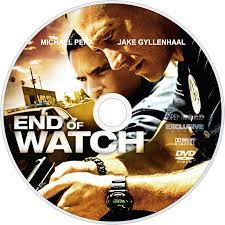End of Watch

This is not so much a buddy-cop movie as it is being thrust into the front seat of an LA patrol car in South Central with "throat-grabbing immediacy". It's raw and appalling and tense and funny, it's harrowing and and moving. I haven't rooted for american law enforcement in a movie in about 35 years, but I did in this one. Jake Gyllenhaal and Michael Peña are at the absolute pinnacle of their game, superbly supported by Natalie Martinez, Anna Kendrick, America Ferrera and Frank Grillo. The soundtrack maps brilliantly to the movie's moments. And I know the 'found-footage' approach is not without its issues, but I rapidly forgave it, then forgot about it as I got lost in those frantic moments. Thanks to SFGate for the review::
From the perch of a police cruiser dashboard, the camera captures the cops as they tear after the bad guys through the streets of Los Angeles - engines roaring, tires screeching, sharp turns taken at nutcase speed - in the breathless, killer intro to the riveting "End of Watch."
Eventually, the bad guys tumble out of their shiny black car and start shooting at the cops behind the dash: two young uniforms who shoot back, hard. The criminals end up dead. The cops (Jake Gyllenhaal and Michael Peña) return to the force a month later, exonerated.
That opener sets a few important things in motion. One is the pacing: You will not be bored. Another is the dramatic tension: it ratchets and rises and rolls. But the chief moving objects are the cameras, whether mounted on the dash, pinned to a chest pocket or carried around by Officer Brian Taylor (Gyllenhaal). The shaky-cam footage documents his life on the force with his partner, Mike Zavala (Peña), as the two of them patrol the hood with good intentions and a startling courage that jostles close to recklessness.
A lot of this is rough on the eyeballs; and when Mexican gangsters get involved, it only gets rougher. Yet the movie balances the messier work of an L.A. cop thriller - shootouts, rescues, missing kids, gruesome discoveries in cramped and rotting backrooms - with a loose, joshing character development that enriches all that wobbly-cam.
The best scenes are filmed inside the cruiser, dashboard shots that face inward instead of out, catching Gyllenhaal and Peña in moments so playful and true they make all other buddy cops look bogus by comparison.
"End of Watch" was written and directed by David Ayer, whose body of work is heavy on gangsters, lowlifes and the gray zone between those who enforce the law and those who break it. His most recent film, "Street Kings," implied top-down, all-out, multi-tentacled corruption throughout the entire LAPD.
That movie was not the apex of realism, nor did it aim to be. This one tries. As a filmmaking gimmick, the found-footage conceit is almost played out - and "End of Watch" doesn't even exploit it consistently, mixing up the guerrilla-video shots with occasional soaring or other illogical POV's.
But at least it's used to deepen its main characters and give them room to breathe; at least it lends the film a lively intimacy that, in its best moments, makes us feel like we're crammed inside the cop car with them.